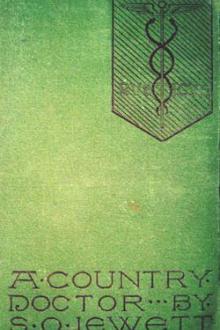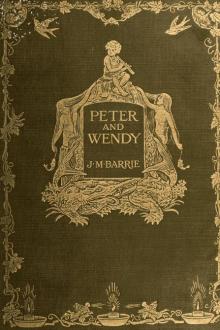A Country Doctor by Sarah Orne Jewett (top novels TXT) 📕

- Author: Sarah Orne Jewett
- Performer: -
Book online «A Country Doctor by Sarah Orne Jewett (top novels TXT) 📕». Author Sarah Orne Jewett
"There was two or three o' the folks round home that acted real warm-hearted towards me, an' urged me to come an' winter with 'em," continued the exile; "an' this mornin' I wished I'd agreed to, 'twas so hard to break away. But now it's done I feel more'n ever it's best. I couldn't bear to live right in sight o' the old place, and come spring I shouldn't 'prove of nothing Is'iah ondertakes to do with the land. Oh, dear sakes! now it comes hard with me not to have had no child'n. When I was young an' workin' hard and into everything, I felt kind of free an' superior to them that was so blessed, an' their houses cluttered up from mornin' till night, but I tell ye it comes home to me now. I'd be most willin' to own to even Is'iah, mean's he is; but I tell ye I'd took it out of him 'fore he was a grown man, if there'd be'n any virtue in cow-hidin' of him. Folks don't look like wild creatur's for nothin'. Is'iah's got fox blood in him, an' p'r'haps 't is his misfortune. His own mother always favored the looks of an old fox, true's the world; she was a poor tool,—a poor tool! I d' know's we ought to blame him same's we do.
"I've always been a master proud woman, if I was riz among the pastures," Mrs. Peet added, half to herself. There was no use in saying much to her; she was conscious of little beside her own thoughts and the smouldering excitement caused by this great crisis in her simple existence. Yet the atmosphere of her loneliness, uncertainty, and sorrow was so touching that after scolding again at her nephew's treachery, and finding the tears come fast to my eyes as she talked, I looked intently out of the car window, and tried to think what could be done for the poor soul. She was one of the old-time people, and I hated to have her go away; but even if she could keep her home she would soon be too feeble to live there alone, and some definite plan must be made for her comfort. Farms in that neighborhood were not valuable. Perhaps through the agency of the law and quite in secret, Isaiah Peet could be forced to give up his unrighteous claim. Perhaps, too, the Winn girls, who were really no longer young, might have saved something, and would come home again. But it was easy to make such pictures in one's mind, and I must do what I could through other people, for I was just leaving home for a long time. I wondered sadly about Mrs. Peet's future, and the ambitious Isabella, and the favorite Sister Winn's daughters, to whom, with all their kindliness of heart, the care of so old and perhaps so dependent an aunt might seem impossible. The truth about life in Shrewsbury would soon be known; more than half the short journey was already past.
To my great pleasure, my fellow-traveler now began to forget her own troubles in looking about her. She was an alert, quickly interested old soul, and this was a bit of neutral ground between the farm and Shrewsbury, where she was unattached and irresponsible. She had lived through the last tragic moments of her old life, and felt a certain relief, and Shrewsbury might be as far away as the other side of the Rocky Mountains for all the consciousness she had of its real existence. She was simply a traveler for the time being, and began to comment, with delicious phrases and shrewd understanding of human nature, on two or three persons near us who attracted her attention.
"Where do you s'pose they be all goin'?" she asked contemptuously. "There ain't none on 'em but what looks kind o' respectable. I'll warrant they've left work to home they'd ought to be doin'. I knowed, if ever I stopped to think, that cars was hived full o' folks, an' wa'n't run to an' fro for nothin'; but these can't be quite up to the average, be they? Some on 'em's real thrif'less; guess they've be'n shoved out o' the last place, an' goin' to try the next one,—like me, I suppose you'll want to say! Jest see that flauntin' old creatur' that looks like a stopped clock. There! everybody can't be o' one goodness, even preachers."
I was glad to have Mrs. Peet amused, and we were as cheerful as we could be for a few minutes. She said earnestly that she hoped to be forgiven for such talk, but there were some kinds of folks in the cars that she never had seen before. But when the conductor came to take her ticket she relapsed into her first state of mind, and was at a loss.
"You'll have to look after me, dear, when we get to Shrewsbury," she said, after we had spent some distracted moments in hunting for the ticket, and the cat had almost escaped from the basket, and the bundle-handkerchief had become untied and all its miscellaneous contents scattered about our laps and the floor. It was a touching collection of the last odds and ends of Mrs. Peet's housekeeping: some battered books, and singed holders for flatirons, and the faded little shoulder shawl that I had seen her wear many a day about her bent shoulders. There were her old tin match-box spilling all its matches, and a goose-wing for brushing up ashes, and her much-thumbed Leavitt's Almanac. It was most pathetic to see these poor trifles out of their places. At last the ticket was found in her left-hand woolen glove, where her stiff, work-worn hand had grown used to the feeling of it.
"I shouldn't wonder, now, if I come to like living over to Shrewsbury first-rate," she insisted, turning to me with a hopeful, eager look to see if I differed. "You see't won't be so tough for me as if I hadn't always felt it lurking within me to go off some day or 'nother an' see how other folks did things. I do' know but what the Winn gals have laid up somethin' sufficient for us to take a house, with the little mite I've got by me. I might keep house for us all, 'stead o' boardin' round in other folks' houses. That I ain't never been demeaned to, but I dare say I should find it pleasant in some ways. Town folks has got the upper hand o' country folks, but with all their work an' pride they can't make a dandelion. I do' know the times when I've set out to wash Monday mornin's, an' tied out the line betwixt the old pucker-pear tree and the corner o' the barn, an' thought, 'Here I be with the same kind o' week's work right over again.' I'd wonder kind o' f'erce if I couldn't git out of it noways; an' now here I be out of it, and an uprooteder creatur' never stood on the airth. Just as I got to feel I had somethin' ahead come that spool-factory business. There! you know he never was a forehanded man; his health was slim, and he got discouraged pretty nigh before ever he begun. I hope he don't know I'm turned out o' the old place. 'Is'iah's well off; he'll do the right thing by ye,' says he. But my! I turned hot all over when I found out what I'd put my name to,—me that had always be'n counted a smart woman! I did undertake to read it over, but I couldn't sense it. I've told all the folks so when they laid it off on to me some: but hand-writin' is awful tedious readin' and my head felt that day as if the works was gone.
"I ain't goin' to sag on to nobody," she assured me eagerly, as the train rushed along. "I've got more work in me now than folks expects at my age. I may be consid'able use to Isabella. She's got a family, an' I'll take right holt in the kitchen or with the little gals. She had four on 'em, last I heared. Isabella was never one that liked house-work. Little gals! I do' know now but what they must be about grown, time doos slip away so. I expect I shall look outlandish to 'em. But there! everybody knows me to home, an' nobody knows me to Shrewsbury; 'twon't make a mite o' difference, if I take holt willin'."
I hoped, as I looked at Mrs. Peet, that she would never be persuaded to cast off the gathered brown silk bonnet and the plain shawl that she had worn so many years; but Isabella might think it best to insist upon more modern fashions. Mrs. Peet suggested, as if it were a matter of little consequence, that she had kept it in mind to buy some mourning; but there were other things to be thought of first, and so she had let it go until winter, any way, or until she should be fairly settled in Shrewsbury.
"Are your nieces expecting you by this train?" I was moved to ask, though with all the good soul's ready talk and appealing manner I could hardly believe that she was going to Shrewsbury for more than a visit; it seemed as if she must return to the worn old farmhouse over by the sheep-lands. She answered that one of the Barnes boys had written a letter for her the day before, and there was evidently little uneasiness about her first reception.
We drew near the junction where I must leave her within a mile of the town. The cat was clawing indignantly at the basket, and her mistress grew as impatient of the car. She began to look very old and pale, my poor fellow-traveler, and said that she felt dizzy, going so fast. Presently the friendly red-cheeked young brakeman came along, bringing the carpet-bag and other possessions, and insisted upon taking the alarmed cat beside, in spite of an aggressive paw that had worked its way through the wicker prison. Mrs. Peet watched her goods disappear with suspicious eyes, and clutched her bundle-handkerchief as if it might be all that she could save. Then she anxiously got to her feet, much too soon, and when I said good-by to her at the car door she was ready to cry. I pointed to the car which she was to take next on the branch line of railway, and I





Comments (0)